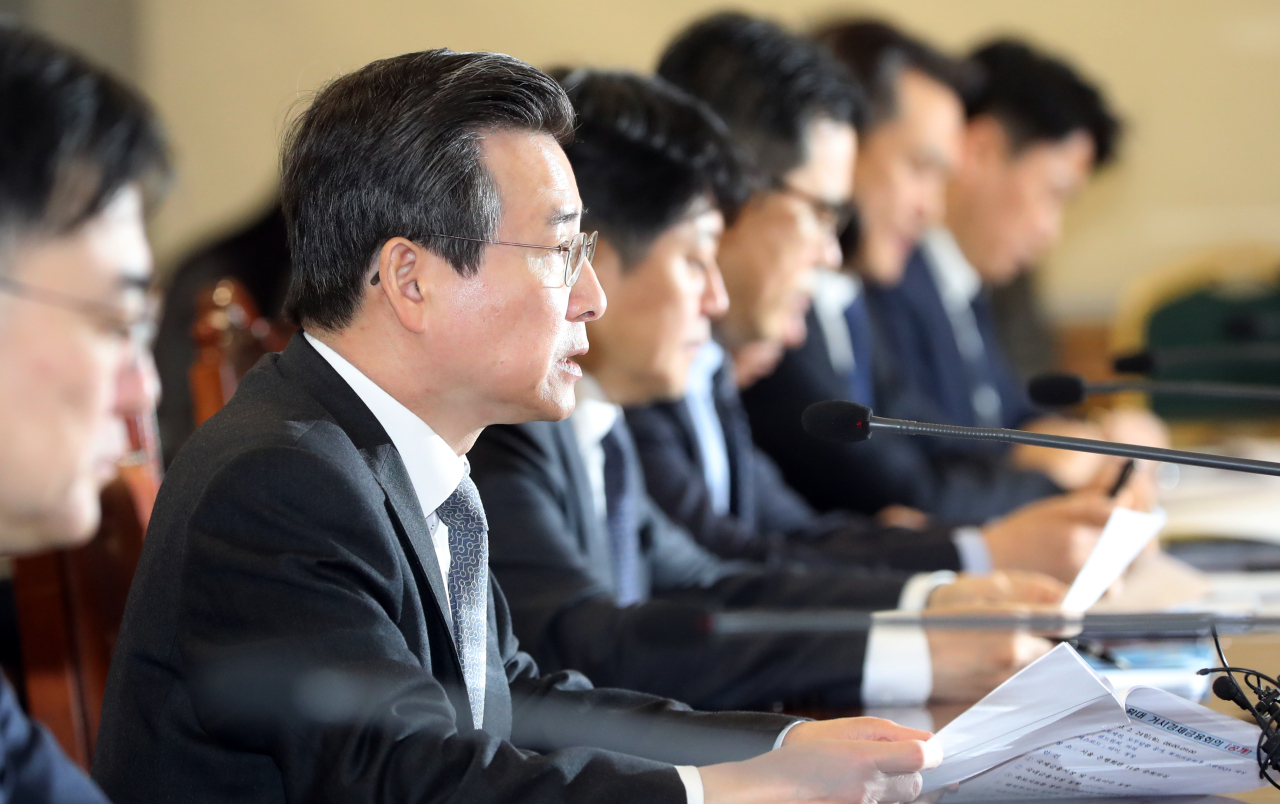 |
Kim Yong-beom, first vice minister of economy and finance, on Monday speaks in a senior-level policy meeting to discuss economic countermeasures to COVID-19. (Yonhap) |
The government said Monday it would soon announce “special actions” to deal with the economic impact of the coronavirus outbreak, defining the current situation as an “economic emergency.”
It added that it would take necessary measures in case of increased volatility in the currency market while maintaining a wait-and-see approach.
“Under the awareness that the current circumstances correspond to an economic emergency, the government will respond in a swift, drastic and active manner to guarantee the people’s safety and to minimize the impact on the economy,” said Kim Yong-beom, first vice minister of economy and finance.
The government’s blueprint will center on the expenditure of all available reserve funds -- from central and local budgets combined -- which totals around 108.2 billion won ($89 million).
While expanding tax reductions and direct financial support for ailing industries and small-sized businesses, authorities reiterated that they would strengthen surveillance of the foreign exchange market for possible speculative action.
The senior fiscal policymaker’s remarks came during a macroeconomy-finance policy meeting to discuss the economic spillover of the COVID-19 outbreak here. The high-level event was held at the Korea Federation of Banks headquarters in central Seoul.
Kim chaired the meeting without Deputy Prime Minister and Finance Minister Hong Nam-ki, who was attending the Group of 20 finance ministers and central bank governors’ meeting in Riyadh, Saudi Arabia. Hong, along with Bank of Korea Gov. Lee Ju-yeol, made an early return back home on Monday morning.
Pointing out heightened uncertainties, Kim cited the Economist’s prediction that the COVID-19 crisis is causing a “viral slowdown” effect and “unquantifiable risks” on the global economy.
“We shall place top priority on stabilizing the people’s lives and economy by enhancing quarantine procedures and supporting affected industries and socially vulnerable groups,” he said.
On the previous day, President Moon Jae-in raised the nation’s alert level to “serious,” the highest in the four-tier system. It was the first time in 11 years that Asia’s fourth-largest economy raised the alert to the top level.
“The financial markets here and abroad will continue to face volatility until the uncertainties related to COVID-19 are alleviated,” Kim said.
The senior official, however, underlined a poised approach as the nation’s stock market is prolonging a net inflow despite the fluctuations.
“The (benchmark) Kospi has shown strong resilience throughout the fluctuations, and foreign buyers have maintained a net buying trend,” he said.
“Considering the high level of financial assets and foreign exchange reserves, we should calmly keep watch instead of worrying excessively over the financial market.”
The country’s foreign exchange reserves as of the end of last month stood at a record high of $409.7 billion, according to data released earlier this month by the Bank of Korea.
Kim also highlighted the response of overseas investors, which he observed during his round table with global credit rating agencies in New York last month.
“Standard & Poor’s displayed confidence toward our government’s swift response and capacities for extra actions,” Kim said.
“(S&P) assessed that the recent (COVID-19) circumstances will have short-lived impact on South Korea and the Asia-Pacific region, concluding that the influence on (Korea’s) sovereign credit rating will be limited.”
By Bae Hyun-jung (
tellme@heraldcorp.com)




![[Herald Interview] 'Trump will use tariffs as first line of defense for American manufacturing'](http://res.heraldm.com/phpwas/restmb_idxmake.php?idx=644&simg=/content/image/2024/11/26/20241126050017_0.jpg)

![[Health and care] Getting cancer young: Why cancer isn’t just an older person’s battle](http://res.heraldm.com/phpwas/restmb_idxmake.php?idx=644&simg=/content/image/2024/11/26/20241126050043_0.jpg)

